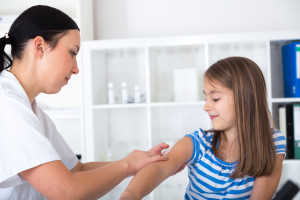 As a parent, HPV can be a scary concept. No one wants to discuss cancer with their pre-teens, but research shows that children should receive the HPV vaccination as early as 11 years old. HPV refers to the sexually transmitted infection (STI) called human papillomavirus (HPV). As the most common STI, more than 100 variations of HPV exist. Some people with HPV never experience symptoms and the virus may go away on its own within a couple years. However, HPV can also lead to genital warts and cancer, with the Center for Disease Control and Prevention (CDC) reporting more than 32,000 cases of HPV-related cancers each year.
As a parent, HPV can be a scary concept. No one wants to discuss cancer with their pre-teens, but research shows that children should receive the HPV vaccination as early as 11 years old. HPV refers to the sexually transmitted infection (STI) called human papillomavirus (HPV). As the most common STI, more than 100 variations of HPV exist. Some people with HPV never experience symptoms and the virus may go away on its own within a couple years. However, HPV can also lead to genital warts and cancer, with the Center for Disease Control and Prevention (CDC) reporting more than 32,000 cases of HPV-related cancers each year.
So, you may be wondering, how is HPV contracted? As an STI, the HPV virus is contracted through skin-to-skin contact, even if intercourse does not take place. Genital contact to the mouth, anus, and vagina can result in contraction of HPV.
According to the CDC, “HPV is a very common virus; nearly 80 million people—about one in four—are currently infected in the United States.” Upward of 14 million people, including teens, will contract the virus each year. HPV affects both men and woman and can cause the following cancers: cervix, vagina, vulva, penis, anus and throat. In addition to the 32,000-plus cases of cervical cancer, the CDC reports, “Every year in the United States, nearly 500,000 women are diagnosed with low grade cervical pre-cancers, and more than 200,000 women are diagnosed with high grade cervical lesions.”
Thanks to advances in medicine, a vaccination can help stop HPV by protecting against cancers caused by the HPV infection. The CDC recommends that all children, male and female, be vaccinated at age 11 or 12. In adolescents, two doses are needed six months apart. Teens over 14 years will need three doses over six months. All woman under 26 and all men under 21 should receive updates to the vaccination as they grow older. Additionally, the LGBTQ community should also receive the vaccination.
In addition to the vaccination, what else can be done to protect children? Talk with your teens, even if you don’t suspect they are engaging in sexual relationships. While these conversations can be tough at the time, remember that your child’s long-term health is paramount. It’s better to have the conversation early, rather than waiting until they are sexually active. Additionally, speak to your teens about proper condom use and monogamous relationships. Lastly, encourage sexually active adults, aged 21 to 65, to receive regular cervical cancer screenings from their doctor.
Sources:
https://www.cdc.gov/hpv/parents/vaccine.html
https://www.plannedparenthood.org/learn/stds-hiv-safer-sex/hpv
More
 Fact: Almost 13,000 new cases of invasive cervical cancer will be diagnosed in the United States, and over 4,100 female lives will be lost due to the disease this year alone.
Fact: Almost 13,000 new cases of invasive cervical cancer will be diagnosed in the United States, and over 4,100 female lives will be lost due to the disease this year alone.
These frightening facts bring to light the terrible reality of the impact that cervical cancer is having on women across the nation. What gives us hope, despite these statistics, is the fact that cervical cancer is the easiest gynecologic cancer to prevent if women take part in regular screenings and follow-ups. There are two tests that your doctor can perform to identify the presence of cervical cancers:
- The Pap test, or Pap smear – This test can identify precancers, or cell changes on the cervix that have the potential to become cervical cancer cells if not properly treated.
- The HPV test – This test can identify human papillomavirus, a virus that can trigger cervical cancer development.
Screening Guidelines
It is generally recommended that women begin receiving regular Pap tests at age 21, and that women receive the test every three years between the ages of 21 and 65. Or, women age 30 and older can obtain the Pap test every five years, instead of three, if the procedure is combined with HPV testing.
Risk Factors
Certain risk factors may increase your chances of being diagnosed with cervical cancer. If you are at a greater risk for the disease, your doctor may recommend more frequent testing. Cervical cancer risk factors include:
- A previous diagnosis of cervical cancer.
- A previous Pap smear that showed precancerous cells.
- Having been exposed to diethylstilbestrol (DES) before birth.
- Being HIV positive.
- Having a weakened immune system due to an organ transplant, chemotherapy, or chronic corticosteroid use.
Cervical Cancer Prevention
While it is possible to prevent cervical cancer is through the early detection of precancerous cells, there are other preventive measures that women can take to lower their risk of developing this form of cancer. To help protect yourself from cervical cancer follow these preventative measures:
- Avoid contact with the human papillomavirus (HPV). HPV is the main cause of cervical cancer. Although HPV can be spread during sex, it can also be spread through skin-to-skin contact with an infected body area.
- Get vaccinated against HPV. It is important to understand that HPV vaccines only work to prevent the HPV infection, however they will not treat an existing infection. The Federal Advisory Committee on Immunization Practices (ACIP) recommends that girls ages 11 to 12 begin the vaccination series for HPV.
- Use condoms during sex. The effective use of condoms will help protect you from contracting HPV.
- Limit your number of sexual partners. The greater your number of sexual partners, the greater your chances of being exposed to HPV.
- Don’t smoke. Smoking may increase your risk of developing cervical pre-cancer, and cancer.
If you have questions regarding you risk factors, or steps you can take to lower your risk of developing cervical cancer, talk to your doctor today.
More
 As a parent, HPV can be a scary concept. No one wants to discuss cancer with their pre-teens, but research shows that children should receive the HPV vaccination as early as 11 years old. HPV refers to the sexually transmitted infection (STI) called human papillomavirus (HPV). As the most common STI, more than 100 variations of HPV exist. Some people with HPV never experience symptoms and the virus may go away on its own within a couple years. However, HPV can also lead to genital warts and cancer, with the Center for Disease Control and Prevention (CDC) reporting more than 32,000 cases of HPV-related cancers each year.
As a parent, HPV can be a scary concept. No one wants to discuss cancer with their pre-teens, but research shows that children should receive the HPV vaccination as early as 11 years old. HPV refers to the sexually transmitted infection (STI) called human papillomavirus (HPV). As the most common STI, more than 100 variations of HPV exist. Some people with HPV never experience symptoms and the virus may go away on its own within a couple years. However, HPV can also lead to genital warts and cancer, with the Center for Disease Control and Prevention (CDC) reporting more than 32,000 cases of HPV-related cancers each year.
